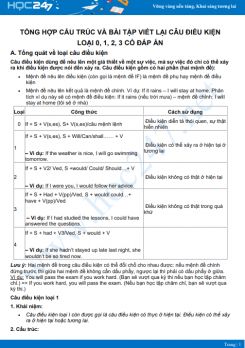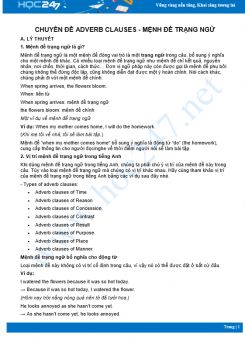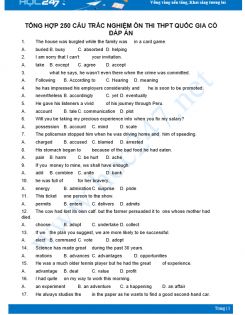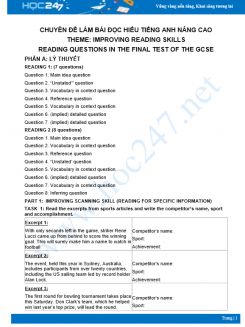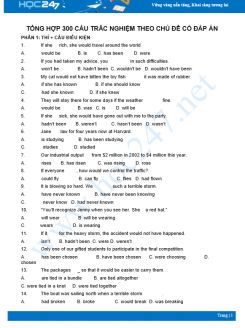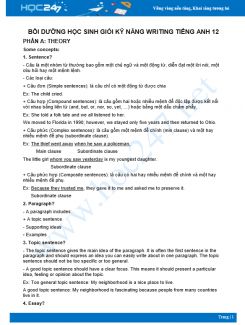─Éß╗ā cung cß║źp th├¬m t├Āi liß╗ću gi├║p c├Īc em hß╗Źc sinh lß╗øp 12 ├┤n tß║Łp chuß║®n bß╗ŗ trŲ░ß╗øc k├¼ thi THPT Quß╗æc gia sß║»p tß╗øi HOC247 giß╗øi thiß╗ću ─æß║┐n c├Īc em t├Āi liß╗ću Chuy├¬n ─æß╗ü Tß╗½ hß║Īn ─æß╗ŗnh ─æŲ░ß╗Żc HOC247 bi├¬n tß║Łp v├Ā tß╗Ģng hß╗Żp vß╗øi phß║¦n ─æß╗ü v├Ā ─æ├Īp ├Īn, lß╗Øi giß║Żi chi tiß║┐t gi├║p c├Īc em tß╗▒ luyß╗ćn tß║Łp l├Ām ─æß╗ü. Hi vß╗Źng t├Āi liß╗ću n├Āy sß║Į c├│ ├Łch cho c├Īc em, ch├║c c├Īc em c├│ kß║┐t quß║Ż hß╗Źc tß║Łp tß╗æt!
CHUY├ŖN ─Éß╗Ć Tß╗¬ Hß║ĀN ─Éß╗ŖNH
PHß║”N A: L├Ø THUYß║ŠT
I. Tß╗¬ Hß║ĀN ─Éß╗ŖNH L├Ć G├ī?
ŌĆō Tß╗½ hß║Īn ─æß╗ŗnh (DETERMINERS) l├Ā tß╗½ ─æß╗®ng trŲ░ß╗øc mß╗Öt danh tß╗½ hoß║Ęc mß╗Öt cß╗źm danh tß╗½ v├Ā trŲ░ß╗øc mß╗Öt t├Łnh tß╗½. Do ─æ├│ m├Ā tß╗½ hß║Īn ─æß╗ŗnh kh├┤ng thß╗ā ─æß╗®ng mß╗Öt m├¼nh m├Ā phß║Żi c├│ mß╗Öt danh tß╗½ hoß║Ęc mß╗Öt cß╗źm danh tß╗½ theo sau.
ŌĆō C├Īc tß╗½ hß║Īn ─æß╗ŗnh hay chß╗ē ─æß╗ŗnh tß╗½ l├Ā nhß╗»ng tß╗½ thŲ░ß╗Øng ─æŲ░ß╗Żc ─æß║Ęt trŲ░ß╗øc c├Īc danh tß╗½ x├Īc ─æß╗ŗnh ─æß╗ā chß╗ē mß╗Öt ngŲ░ß╗Øi/sß╗▒ viß╗ćc/sß╗▒ vß║Łt cß╗ź thß╗ā hoß║Ęc ─æß║Ęc biß╗ćt m├Ā bß║Īn ─æang ─æß╗ü cß║Łp ─æß║┐n.
II. C├üC LOß║ĀI Tß╗¬ Hß║ĀN ─Éß╗ŖNH
|
Loß║Īi tß╗½ hß║Īn ─æß╗ŗnh |
Liß╗ćt k├¬ |
V├Ł dß╗ź |
|
ŌĆō Mß║Īo tß╗½ |
a, an, the |
|
|
ŌĆō Tß╗½ hß║Īn ─æß╗ŗnh chß╗ē ─æß╗ŗnh |
this, that, these, those |
|
|
ŌĆō Tß╗½ hß║Īn ─æß╗ŗnh sß╗¤ hß╗»u |
my, his, her, your, our, their, its |
|
|
ŌĆō Tß╗½ chß╗ē sß╗æ lŲ░ß╗Żng |
all, every, most, many, much, some, few, little, any, noŌĆ” |
|
|
ŌĆō Sß╗æ tß╗½ |
one, two, three, first, second, third,ŌĆ”.. |
|
|
ŌĆō Tß╗½ hß║Īn ─æinh Nghi vß║źn |
whose, which, what |
|
III. C├üCH D├ÖNG C├üC LOß║ĀI Tß╗¬ Hß║ĀN ─Éß╗ŖNH
1. Mß║Īo tß╗½ (Articles)
ŌĆō Mß║Īo tß╗½ l├Ā Tß╗½ hß║Īn ─æß╗ŗnh phß╗Ģ biß║┐n nhß║źt.
ŌĆō Gß╗ōm 3 tß╗½: a, an, the
ŌĆō Mß║Īo tß╗½ ─æŲ░ß╗Żc chia th├Ānh 2 loß║Īi: Mß║Īo tß╗½ x├Īc ─æß╗ŗnh v├Ā kh├┤ng x├Īc ─æß╗ŗnh.
|
Mß║Īo tß╗½ kh├┤ng x├Īc ─æß╗ŗnh |
Mß║Īo tß╗½ x├Īc ─æß╗ŗnh |
|
|
D├╣ng vß╗øi |
|
|
|
D├╣ng khi |
|
|
|
V├Ł dß╗ź |
|
|
2. Tß╗½ hß║Īn ─æß╗ŗnh chß╗ē ─æß╗ŗnh (Demonstrative Determiners)
ŌĆō Tß╗½ hß║Īn ─æß╗ŗnh chß╗ē ─æß╗ŗnh d├╣ng ─æß╗ā chß╗ē sß╗▒ xa hay gß║¦n cß╗¦a ai ─æ├│ vß╗øi ngŲ░ß╗Øi n├│i.
ŌĆō Gß╗ōm 4 tß╗½: this, that, these, those
|
Gß║¦n |
Xa |
|
|
Sß╗æ ├Łt |
This |
That |
|
Số nhiều |
These |
Those |
Eg:
- I like this color.
(T├┤i th├Łch m├Āu n├Āy.) - That man over there looks scary.
(NgŲ░ß╗Øi ─æ├Ān ├┤ng ß╗¤ ─æ├│ tr├┤ng ─æ├Īng sß╗Ż.) - These books belong to mine.
(Bß║Īn c├│ thß╗ā nh├¼n thß║źy nhß╗»ng t├▓a nh├Ā ─æ├│?) - Can you see those buildings?
(Bß║Īn c├│ thß╗ā nh├¼n thß║źy nhß╗»ng t├▓a nh├Ā ─æ├│?)
3. Tß╗½ hß║Īn ─æß╗ŗnh sß╗¤ hß╗»u (Possessive Determiners)
ŌĆō Tß╗½ hß║Īn ─æß╗ŗnh sß╗¤ hß╗»u, hay c├▓n gß╗Źi l├Ā T├Łnh tß╗½ sß╗¤ hß╗»u, ─æŲ░ß╗Żc d├╣ng ─æß╗ā chß╗ē viß╗ćc ai ─æ├│ ─æang ŌĆ£sß╗¤ hß╗»uŌĆØ mß╗Öt thß╗® g├¼ ─æ├│.
ŌĆō Gß╗ōm 7 tß╗½: my, your, his, her, its, our, their
Eg:
- We sold our house last week.
Ch├║ng t├┤i ─æ├Ż b├Īn ng├┤i nh├Ā cß╗¦a ch├║ng t├┤i v├Āo tuß║¦n trŲ░ß╗øc. - Your wish is my commend.
Mong Ų░ß╗øc cß╗¦a bß║Īn l├Ā lß╗Øi khen ngß╗Żi cß╗¦a t├┤i. - Her dress is from the latest collection.
Bß╗Ö v├Īy cß╗¦a c├┤ ß║źy l├Ā tß╗½ bß╗Ö sŲ░u tß║Łp mß╗øi nhß║źt.
ŌĆō Ch├║ ├Į:
+ Kh├┤ng nhß║▒m lß║½n Tß╗½ hß║Īn ─æß╗ŗnh sß╗¤ hß╗»u, hay c├▓n gß╗Źi l├Ā T├Łnh tß╗½ sß╗¤ hß╗»u, vß╗øi ─Éß║Īi tß╗½ sß╗¤ hß╗»u.
+ Ph├ón biß╗ćt ITS (cß╗¦a n├│) vß╗øi ITŌĆÖS (= IT + IS):
Eg:
- The cat licks its fur. ŌåÆ Con m├©o liß║┐m l├┤ng cß╗¦a n├│.
- ItŌĆÖs raining. = It is raining. ŌåÆ Trß╗Øi ─æang mŲ░a.
- Look at the train! ItŌĆÖs comming. = It is comming ŌåÆ Nh├¼n t├Āu hß╗Åa k├¼a! N├│ ─æang tiß║┐n ─æß║┐n.
4. Tß╗½ chß╗ē sß╗æ lŲ░ß╗Żng (Quantifiers )
ŌĆō Tß╗½ chß╗ē sß╗æ lŲ░ß╗Żng l├Ā nhß╗»ng tß╗½ m├┤ tß║Ż sß╗æ lŲ░ß╗Żng cß╗¦a mß╗Öt cß╗źm danh tß╗½.
|
Chß╗ē d├╣ng vß╗øi danh tß╗½ ─æß║┐m ─æŲ░ß╗Żc |
Chß╗ē d├╣ng vß╗øi danh tß╗½ kh├┤ng ─æß║┐m ─æŲ░ß╗Żc |
D├╣ng cho cß║Ż hai loß║Īi danh tß╗½ |
|
ŌĆō a few |
ŌĆō a little |
ŌĆō all |
Eg:
- I buy every book from this author.
T├┤i mua nhß╗»ng cuß╗æn s├Īch tß╗½ t├Īc giß║Ż n├Āy. - All students from this school passed the entrance exam.
Tß║źt cß║Ż hß╗Źc sinh tß╗½ trŲ░ß╗Øng n├Āy ─æ├Ż vŲ░ß╗Żt qua kß╗│ thi tuyß╗ān sinh. - She had no money.
C├┤ ß║źy kh├┤ng c├│ tiß╗ün.
a. Tß╗½ hß║Īn ─æß╗ŗnh: ENOUGH
Enough = ŌĆ£─æß╗¦ŌĆØ
ŌĆō C├┤ng thß╗®c d├╣ng vß╗øi tß╗½ Enough:
Enough + danh từ
ŌĆō Trong trŲ░ß╗Øng hß╗Żp ŌĆ£enoughŌĆØ l├Ā trß║Īng tß╗½, ta c├│ c├┤ng thß╗®c sau:
T├Łnh tß╗½ / Trß║Īng tß╗½ / ─Éß╗Öng tß╗½ + Enough
Eg:
- There are enough chairs for everyone here. ŌåÆ danh tß╗½ ŌĆ£chairŌĆØ
C├│ ─æß╗¦ ghß║┐ cho mß╗Źi ngŲ░ß╗Øi ß╗¤ ─æ├óy. - I hadnŌĆÖt trained enough for the job. ŌåÆ ─æß╗Öng tß╗½ ŌĆ£trainŌĆØ
T├┤i ─æ├Ż kh├┤ng ─æŲ░ß╗Żc ─æ├Āo tß║Īo ─æß╗¦ ─æß╗ā l├Ām viß╗ćc - This house isnŌĆÖt big enough for us. ŌåÆ t├Łnh tß╗½ ŌĆ£bigŌĆØ
Ng├┤i nh├Ā n├Āy kh├┤ng ─æß╗¦ lß╗øn cho ch├║ng t├┤i - We didnŌĆÖt leave early enough. ŌåÆ trß║Īng tß╗½ ŌĆ£earlyŌĆØ
- Ch├║ng t├┤i ─æ├Ż kh├┤ng ─æß╗ā lß║Īi sß╗øm.
b. Số từ (Numbers)
ŌĆō Gß╗ōm sß╗æ ─æß║┐m v├Ā sß╗æ thß╗® tß╗▒:
+ Sß╗æ ─æß║┐m: one, two, three,ŌĆ”.
+ Sß╗æ thß╗® tß╗▒: first, second, third,ŌĆ”
Eg:
- There are about two hundred (200) people on the street.
(C├│ khoß║Żng hai tr─ām (200) ngŲ░ß╗Øi tr├¬n ─æŲ░ß╗Øng phß╗æ.) - He has just made his second score.
(Anh ß║źy ─æ├Ż ghi b├Ān thß╗® hai.) - The first three people who answer correctly will get a present.
(Ba ngŲ░ß╗Øi ─æß║¦u ti├¬n trß║Ż lß╗Øi ch├Łnh x├Īc sß║Į nhß║Łn ─æŲ░ß╗Żc mß╗Öt m├│n qu├Ā.)
c. Tß╗½ hß║Īn ─æinh Nghi vß║źn (Interrogative Determiners)
ŌĆō Gß╗ōm 3 tß╗½: which, what, whose.
+ Whose d├╣ng ─æß╗ā thß╗ā hiß╗ćn ├Į ŌĆ£thuß╗Öc vß╗ü ai ─æ├│ŌĆØ. Whose thŲ░ß╗Øng ─æŲ░ß╗Żc d├╣ng nhiß╗üu trong c├Īc c├óu li├¬n quan ─æß║┐n Mß╗ćnh ─æß╗ü quan hß╗ć ŌĆō ─Éß║Īi tß╗½ quan hß╗ć.
+ What d├╣ng ─æß╗ā hß╗Åi th├┤ng tin cß╗ź thß╗ā vß╗ü mß╗Öt ─æiß╗üu g├¼ ─æ├│.
+ Which c┼®ng d├╣ng ─æß╗ā hß╗Åi th├┤ng tin cß╗ź thß╗ā vß╗ü mß╗Öt ─æiß╗üu g├¼ ─æ├│, nhŲ░ng l├Ā tß╗½ mß╗Öt tß║Łp hß╗Żp ─æ├Ż cß╗æ ─æß╗ŗnh sß║Ąn. (ngŲ░ß╗Øi hß╗Åi ─æ├Ż c├│ mß╗Öt sß╗æ lß╗▒a chß╗Źn nhß║źt ─æß╗ŗnh v├Ā hß╗Åi ngŲ░ß╗Øi nghe l├Ā th├Łch c├Īi n├Āo trong sß╗æ ─æ├│)
Eg:
- What sports do you like?
Bß║Īn th├Łch m├┤n thß╗ā thao n├Āo? - Which dress do you like? The red one or the green one?
Bß║Īn th├Łch c├Īi v├Īy n├Āo? M├Āu ─æß╗Å hoß║Ęc m├Āu xanh lß╗źc? - Whose iPhone was stolen?
IPhone cß╗¦a ai ─æ├Ż bß╗ŗ ─æ├Īnh cß║»p?
d. Tß╗½ hß║Īn ─æß╗ŗnh chß╗ē Sß╗▒ kh├Īc biß╗ćt
ŌĆō C├│ 3 tß╗½ hß║Īn ─æß╗ŗnh chß╗ē sß╗▒ kh├Īc biß╗ćt. ─É├│ l├Ā: another, other v├Ā the other.
ŌĆō C├Īch d├╣ng:
+ Another: d├╣ng ─æß╗ā chß╗ē mß╗Öt c├Īi g├¼ ─æ├│ kh├Īc, hoß║Ęc th├¬m v├Āo c├Īi ─æ├Ż n├│i ─æß║┐n trŲ░ß╗øc ─æ├│
*D├╣ng vß╗øi danh tß╗½ sß╗æ ├Łt
- Would you like another cup of coffee? ŌåÆ th├¬m 1 cß╗æc c├Ā ph├¬ nß╗»a
- Another reason to reject his offer isŌĆ”. ŌåÆ th├¬m 1 l├Į do nß╗»a l├ĀŌĆ”
+ Other: d├╣ng ─æß╗ā chß╗ē mß╗Öt c├Īi g├¼ ─æ├│ kh├Īc hß║│n vß╗øi c├Īi ─æ├Ż n├│i ─æß║┐n trŲ░ß╗øc ─æ├│
*D├╣ng vß╗øi danh tß╗½ sß╗æ nhiß╗üu
- I have no other ideas. ŌåÆ ├Į kiß║┐n kh├Īc
- There are other jobs you could try. ŌåÆ c├┤ng viß╗ćc kh├Īc
+ The other: d├╣ng ─æß╗ā chß╗ē ─æß║┐n (nhß╗»ng) c├Īi c├▓n lß║Īi trong (nhß╗»ng) c├Īi ─æ├Ż n├│i ─æß║┐n trŲ░ß╗øc ─æ├│
*d├╣ng vß╗øi danh tß╗½ sß╗æ ├Łt hoß║Ęc sß╗æ nhiß╗üu
- I enjoyed the first book but I didnŌĆÖt read the other books in the series. ŌåÆ nhß╗»ng cuß╗æn c├▓n lß║Īi trong series
- Where is the other box of candy? ŌåÆ hß╗Öp kß║╣o c├▓n lß║Īi
PHß║”N B: V├Ź Dß╗ż
Exercise 1
1. The young man and the young woman paid_______ attention to the writer.
a. none b. any c. not any d. no
2. Mr. Scott has a garage in Silbury. His_______ garage is in Pinhurst.
a. another b. other c. else d. different
3. Bill FrithŌĆÖs garden is larger than JoeŌĆÖs. It is _______
a. larger garden b. a large garden c. large garden d. largest garden
4. JoeŌĆÖs garden is more interesting_______ BillŌĆÖs
a. by b. for c. than d. from
5. JoeŌĆÖs garden is the best in the town. ItŌĆÖs the best_______ them all.
a. in b. of c. than d. from
6. JoeŌĆÖs garden is interesting. Joe is _______ in gardening.
a. interesting b. interest c. interestingly d. interested
7. The writer doesnŌĆÖt like hard work. ItŌĆÖs_______ to look after a garden.
a. a hard work b. a hard job c. hard job d. hardly a job
8. Harry sat at the same table. He didnŌĆÖt sit at _______ one.
a. other b. a different c. extra d. another
9. We shall have plenty of time. There will be_______ time to see him.
a. enough b. almost enough c. less than enough d. hardly enough
10. Most of the young people will be there. _______ the young people will be there.
a. A lot b. Nearly all c. Some d. Many
11. I speak a few words of French. I donŌĆÖt know_______ French
a. many b. much c. plenty of d. a little
12. The firm couldnŌĆÖt pay_______ large salaries.
a. so b. such a c. such d. a such
13. _______ turn is it? ItŌĆÖs your turn.
a. Which b. To whom c. Whom d. Whose
14. I might as well have them. I am_______ to have them.
a. very pleased b. very glad c. not very glad d. delighted
15. I am even less lucky. I am _______ lucky.
a. more b. as c. not d. so
16. His bag is empty. He has_______
a. a empty bag b. and empty bag c. empty bag d. one empty bag
17. I am one of the few people left. So there_______
a. are none left b. is one left c. are some left d. are lot left
18. She received a letter from a girl of her own age. The girl is_______ she is.
a. the same age with b. the same age c. as old d. the same age as
19. I like my sisterŌĆÖs house. ItŌĆÖs a _______
a. new beautiful house b. beautiful house new
c. beautiful new house d. the same age as
20. She will come to England _______ year.
a. last b. next c. the other d. the last
Exercise 2
1. _______ room was it? This gentlemenŌĆÖs
a. To whom b. Who c. Whose d. Of whom
2. We like them_______ we like pretty curtain material.
a. just as b. the same c. just the same d. so
3. It is one of the ugliest faces I have ever seen. IŌĆÖve never seen_______
a. an ugly one b. an ugliest one c. the ugliest one d. an uglier one
4. This is the most surprising thing about it. It is_______ than anything.
a. most surprising b. more surprising c. more surprised d. most surprised
5. He used to work fourteen hours a day. He did this_______ day.
a. one b. some c. each d. a
6. He had a shop of his own. It was_______ shop.
a. his own b. hisŌĆÖs c. hisŌĆÖown d. whose is
7. _______ this bicycle? Their sonŌĆÖs
a. whoŌĆÖs is b. whoses c. whoŌĆÖs d. whose is
8. people are no so honest as they once were. They are_______ honest.
a. as b. so c. less d. fewer
9. There were fewer people in the shop than usual. There were_______
a. as many as usual b. not as many as usual
c. a few as usual d. more than usual
10. The woman bought a few small articles. She bought_______
a. a little b. some c. one d. three
11. How_______ was the shore? Eight miles.
a. away far b. far from c. far away d. long
12. They got such a fright. They were_______
a. so frightful b. such frightened c. so frightened d. such fright
13. She was a young woman. The woman was_______
a. a youth b. young c. a young d. youth
14. The operation roved to be every difficult. It proved to be_______ operation.
a. difficult b. the difficult c. a difficult d. difficult the
15. A great many good were sent. There were_______
a. quite a few b. quite a little c. not too many d. very much
16. It has a head like a horse_______ head was like that of a horse.
a. It b. ItŌĆÖs c. ItŌĆÖs d. Its
17. The strike will last for a week. ThatŌĆÖs what_______ people believe.
a. most of b. the most of c. the more d. most
18. We went so unwillingly to school. We were _______ unwilling pupils.
a. such b. so c. so much d. such an
19. People will do anything to see a free show-even if it is_______
a. badly b. bad one c. a bad d. bad
20. He hardly used_______ large car that he owned.
a. his b. a c. the d. any
Exercise 3
1. They did not find_______
a. nothing of value b. a valuable thing c. any value d. anything valuable
2. They stagger home loaded with_______ necessities as they can carry.
a. as many of the b. as many c. so many d. the most
3. The _______ is the Gouffre Berger near Grenoble.
a. deepest cave known in the world b. cave deepest known in the world
c. worldŌĆÖs cave known deepest. d. deepest cave in the worldŌĆÖs knowledge
4. The bigger the risk an insurance company takes, the higher the premium you will have to pay.
a. The higher you will have b. the more you will have
c. ore you will have d. you will have higher.
5. Modern dances proved to be _______ the dish could bear.
a. too much for b. as much as c. so much that d. so much for
6. The public are often far more interested_______ political events.
a. in peopleŌĆÖs stories than b. in stories about people than
c. with stores about people then d. by peopleŌĆÖs stories than by
7. We are_______ dependent on specialized labour as we used to be.
a. increasingly less b. becoming not so c. not nearly as d. becoming less
8. _______ spend hours of their leisure time.
a. men of each age b. men of every age
c. all ages of men d. whatever a manŌĆÖs age, they
9. Whatever it is, a fused light, _______ furniture, a clogged pipe, a broken down vacuum cleaner, wives expect their husbands to put things right.
a. shaked b. shaken c. a shaky d. shaky
10. Drilling a hole under the sea has proved more difficult than_______
a. drilling one on lad b. under the land
c. to drill a hole on land d. a hole on the land
11. The bottle hasa_______
a. green delicately shaded tint b. delicately shaded green tint
c. green tinted delicate shade d. delicate shade of green tint.
12. _______ belongings people accumulate.
a. as they get older more b. In getting older there are more
c. only when they get older, do more d. the older they get the more
13. I like him very much, he is_______
a. quite an intelligent boy b. quite intelligent boy
c. a quite intelligent boy d. a boy quite intelligent
14. Nowadays_______ women get university degrees.
a. either b. every c. both d. many
15. NamŌĆÖs parents are_______ with his success.
a. please b. pleasant c. pleasing d. pleased
16. It is an _______ story.
a. interesting b. interested c. interest d. all are correct
17. My daughter can make only few sandwiches with_______ flour left in that paper bag.
a. so much b. so may c. so few d. the little
18. Those are_______ books we still have this library.
a. few b. the few c. a few d. the little
19. Many other_______ afraid of walking in the darkness.
a. girls are b. girl are c. girls is d. girl is
20. Some people can stand_______ criticism, others canŌĆÖt stand_______
a. much/ any b. much/ a few c. a little/ some d. little/ few
Exercise 4
1. I did not see_______ seagulls soaring into the sky
a. some b. any c. no d. few
2. The _______ prisoner has been recaptured.
a. escaped b. escaping c. having escaped d. escape
3. A man who has wide knowledge is called a (n) _______ man.
a. inform-well b. informed-well c. informing-well d. well-informed
4. My dress is quite yours.
a. differ from b. different to c. differ to d. different from
5. The students donŌĆÖt review_______ English lessons.
a. them b. their c. their d. none is correct
6. We still have _______ money.
a. many b. few c. some d. none
7. Everyone should do _______ duty (British English)
a. their b. her c. his d. oneŌĆÖs
8. I can write this report with_______ pencil.
a. a b. an c. the d. no article is needed
9. Do you have_______ books?
a. little b. much c. some d. any
10. We want out country to be free and ______
a. independent b. independence c. independent d. independently
11. He is ______ of three.
a. best b. good c. better d. the best
12. I canŌĆÖt speak______ English.
a. many b. much c. very d. the best
13. ______ games that we like best are ______ tennis and football
a. The/ the b. The/ no article c. No article/ the d. No article/ no article
14. You can write this essay in______ ink or with______ pencil.
a. The/ the b. no article/ the c. the/ no article d. no article/ no article
15. The church has______ pictures.
a. some French old b. some old French c. old French some d. French old some
16. The library has several______
a. very English easy books b. very easy English books
c. English very easy books d. easy very English books
17. A man with one leg is called______
a. a one leg man b. a one-leged man c. a one-legged man d. one-leg man
18. Give me______ information, please.
a. father b. further c. little d. many
19. My mother gave me too______ money.
a. many a b. much more c. little d. many
20. Very______ people understand what he said.
a. some b. little c. few d. less
Exercise 5
1. I have______ books of my own.
a. no b. not c. any d. much
2. He is______
a. a three years old boy b. a three year old boy
c. three years boy d. three year old boy
3. I would like to buy______ one-legged table.
a. a b. an c. many d. the
4. My grandfather has a garage. The garage is______
a. to him b. of him c. of his d. his
5. One should respect______ parents.
a. their b. his c. oneŌĆÖs d. her
6. That lawyer is______ than he looks.
a. more young b. more younger c. much younger d. much more younger
7. I have a ______ building.
a. two-hundred-room b. two hundred rooms
c. two hundred a room d. two hundred rooms
8. Leman tastes______
a. sour b. sourly c very sourly d. to be sour
9. How many sweets does Tom have?
a. quite a few b. very little c. less than I d. not much
10. John, how are you to day? I am ______ that I can meet you.
a. too glad b. very glad c. so glad d. such glad
11. I never met______ man before.
a. a so good b. so good a c. so a good d. good so a
12. I think itŌĆÖs______ for walking.
a. much too hot b. too much heat c. very much hot d. very much heat
13. What kind of car did you buy? Well, think itŌĆÖs somewhat______ yours.
a. as b. like c. alike d. similar as
14. There isnŌĆÖt much ______ news in todayŌĆÖs paper.
a. to surprise b. surprised c. surprising d. to have surprised
15. The family never agree about______ shares of the property.
a. her b. its c. their d. his
16. We hada______ dinner and ran to the theatre.
a. quickly b. quick c. more quick d. quickest
17. IŌĆÖve always found Fred to bea. ______ person.
a. politely b. impolitely c. not polite d. polite
18. He is a ______ customer.
a. regular b. regularly c. irregular d. not regular
19. A______ breeze touched my face.
a. gently b. gentler c. gentle d. more gently
20. The audience booed the actorsŌĆÖ______ performance.
a. bad b. badly c. worse d. worst
Exercise 6
1. ______ has just arrived
a. A piece of new equipments b. A few new equipments
c. There are some new equipment which d. A lot of new equipment
2. ______students enrolled this year than last year.
a. Less of the b. A few of c. A few more d. There were a few
3. You donŌĆÖt hear______ news about Mr. Allen these days.
a. many b. much c. a lot d. much of
4. ŌĆ£Are you going to hunt this year?ŌĆØ
ŌĆ£I donŌĆÖt know. There are______ deer in this areaŌĆØ.
a. so few b. so little c. no a lot of d. only a few of
5. ŌĆ£Are you sure you donŌĆÖt want to go to the movies tonight?ŌĆØ.
ŌĆ£I canŌĆÖt. I have______ŌĆØ.
a. too many homeworks b. much too much homework
c. much too many homework d. too much homework assignments
6. ŌĆ£How was our trip to Fort Knox, Kentucky?ŌĆØ
ŌĆ£IŌĆÖve never seen______ bars in one placeŌĆØ.
a. so much gold b. so many gold c. more than a little d. as much of gold
7. IŌĆÖm sorry IŌĆÖm late. I hope I didnŌĆÖt cause you______
a. too much problems b. problem c. many more trouble d. too much trouble
8. ŌĆ£The price of chocolate has really gone upŌĆØ.
ŌĆ£Yes, they give you______ for your money nowŌĆØ.
a. so few b. so less c. so little d. fewer
9. ŌĆ£______ do you think we need?ŌĆØ
ŌĆ£Oh, about a gallonŌĆØ.
a. How much paint b. How much of paint
c. How much paint d. How many paints
10. ŌĆ£IŌĆÖm looking for something to eatŌĆØ.
ŌĆ£ThereŌĆÖs ______ meat in the refrigeratorŌĆØ.
a. a little of b. a little c. a few d. some few meat
11. IŌĆÖve never seen______ people in one place.
a. so much b. so many c. so much of d. this many of
12. ŌĆ£What would you like to drink?ŌĆØ
ŌĆ£IŌĆÖll have______, pleaseŌĆØ.
a. a coffee cup b. small coffee c. a little coffee d. a cup coffee
13. ŌĆ£Henry wasnŌĆÖt able to give us______ informationŌĆØ.
ŌĆ£ThatŌĆÖs too bad. We really needed itŌĆØ.
a. much b. any of c. many d. a lot
14. ______ fish are there in that bowlŌĆØ
a. How much number of b. How many
c. Do you know how much d. What is the number of
15. ______ do we need for the winter?
a. How many woods b. How many wood
c. How much of wood d. How much wood
16. We have heard______ about you.
a. so many news b. so much news c. a lot news d. few news
17. We have______ this year than last year.
a. fewer cows b. smaller cows c. much cows d. many cows
18. Some people are panning to vote, but______ are staying home.
a. much of them b. more of them c. little of them d. many of them
19. A teacherŌĆÖs equipment usually includes______
a. a few pieces of chalk b. a few chalks
c. a little number of chalk d. a small number of chalk
20. There is ______ ink in the pot.
a. few b. small c. little d. a lot
ĐÁP ÁN
Exercise 1
|
1d |
2a |
3b |
4c |
5b |
6d |
7b |
8b |
9a |
10b |
|
11b |
12c |
13d |
14c |
15c |
16b |
17c |
18d |
19a |
20b |
Exercise 2
|
1c |
2a |
3d |
4b |
5c |
6a |
7d |
8c |
9b |
10b |
|
11d |
12c |
13b |
14c |
15a |
16d |
17d |
18a |
19d |
20c |
Exercise 3
|
1d |
2b |
3a |
4b |
5b |
6b |
7c |
8b |
9c |
10a |
|
11b |
12d |
13a |
14d |
15d |
16a |
17d |
18b |
19a |
20a |
Exercise 4
|
1b |
2a |
3d |
4d |
5c |
6c |
7a |
8a |
9d |
10a |
|
11d |
12b |
13b |
14b |
15b |
16b |
17c |
18b |
19c |
20c |
Exercise 5
|
1a |
2b |
3a |
4d |
5c |
6c |
7a |
8a |
9a |
10b |
|
11b |
12a |
13b |
14c |
15c |
16b |
17d |
18a |
19c |
20a |
Exercise 6
|
1d |
2c |
3b |
4a |
5b |
6b |
7d |
8c |
9c |
10b |
|
11b |
12c |
13a |
14b |
15d |
16b |
17a |
18d |
19a |
20c |
PHß║”N C: B├ĆI Tß║¼P Vß║¼N Dß╗żNG
1. Ho├Ān th├Ānh mß╗Śi c├óu vß╗øi mß╗Öt tß╗½ hß║Īn ─æß╗ŗnh cß╗ź thß╗ā.
1. My relatives have finally shared ŌĆ”ŌĆ”ŌĆ”ŌĆ”ŌĆ”.. vacation plans.
2. I left ŌĆ”ŌĆ”ŌĆ”ŌĆ”ŌĆ”.. book on the nightstand on purpose.
3. ŌĆ”ŌĆ”ŌĆ”ŌĆ”ŌĆ”ŌĆ”ŌĆ”.. shoes are these? Pick them up!
4. I donŌĆÖt knowŌĆ”ŌĆ”ŌĆ”ŌĆ”ŌĆ”. bus to take.
5. John brought ŌĆ”ŌĆ”ŌĆ”ŌĆ”ŌĆ”.. friend home for the weekend.
6. Did you remember to bring ŌĆ”ŌĆ”ŌĆ”ŌĆ”ŌĆ”ŌĆ”. umbrella ?
7. I hope ŌĆ”ŌĆ”ŌĆ”ŌĆ”ŌĆ”ŌĆ”. reptiles donŌĆÖt belong to you.
8. One of ŌĆ”ŌĆ”ŌĆ”ŌĆ”ŌĆ”ŌĆ”ŌĆ”.. greatest pleasures is spending time with ŌĆ”ŌĆ”ŌĆ”ŌĆ”ŌĆ”ŌĆ”.dog.
9. Look at that lamp: ŌĆ”ŌĆ”ŌĆ”ŌĆ”ŌĆ”ŌĆ”ŌĆ”.. shade is crooked.
2. Chß╗Źn tß╗½ hß║Īn ─æß╗ŗnh ch├Łnh x├Īc ─æiß╗ün v├Āo chß╗Ś trß╗æng
1. ŌĆ”ŌĆ”ŌĆ”ŌĆ”ŌĆ”ŌĆ”ŌĆ”ŌĆ”. the evening we watched television.
A. most B. most of C. both are correct
2. ŌĆ”ŌĆ”ŌĆ”ŌĆ”ŌĆ”ŌĆ”.. you are not going to graduate.
A. some B. some of C. someone
3. ŌĆ”ŌĆ”ŌĆ”ŌĆ”ŌĆ”ŌĆ”ŌĆ” my friends can attend the party.
A. none of B. none C. no
4. ŌĆ”ŌĆ”ŌĆ”ŌĆ”ŌĆ”ŌĆ”ŌĆ” her friends have already joined.
A. several B. several of C. both are correct
5. I have labeled ŌĆ”ŌĆ”ŌĆ”ŌĆ”ŌĆ”ŌĆ”ŌĆ”.. bottle with a name.
A. each B. each of C. both are correct
6. We have ŌĆ”ŌĆ”ŌĆ”ŌĆ”ŌĆ”ŌĆ”.. problems, most of the time.
A. few B. the few C. a few
7. ŌĆ”ŌĆ”ŌĆ”ŌĆ”ŌĆ”ŌĆ”ŌĆ”. student came prepared.
A. neither B. neither of C. both are correct
3. D├╣ng tß╗½ hß║Īn ─æß╗ŗnh ─æ├║ng ─æß╗ā viß║┐t lß║Īi c├Īc c├óu dŲ░ß╗øi ─æ├óy.
1. There arenŌĆÖt much people here.
2. How many are you getting paid?
3. I drank many of the milk myself.
4. Susan drinks much of soda.
5. What a lousy menu. There arenŌĆÖt much of choices.
6. Did you tell her how many you liked it?
7. She got much As this semester.
4. Ho├Ān th├Ānh c├óu vß╗øi all hoß║Ęc (a/ the) whole .
1. He ate ŌĆ”ŌĆ”ŌĆ”ŌĆ”ŌĆ”ŌĆ”ŌĆ” cake by himself.
2. Liza spent ŌĆ”ŌĆ”ŌĆ”ŌĆ”ŌĆ”ŌĆ”ŌĆ”ŌĆ” her money on candy.
3. Rick demanded to be told ŌĆ”ŌĆ”ŌĆ”ŌĆ”ŌĆ”ŌĆ” truth.
4. ŌĆ”ŌĆ”ŌĆ”ŌĆ”ŌĆ”ŌĆ”ŌĆ” her life, Jean has wanted to ski.
5. I waited ŌĆ”ŌĆ”ŌĆ”ŌĆ”ŌĆ”ŌĆ”ŌĆ” day for you to call.
6. We ŌĆ”ŌĆ”ŌĆ”ŌĆ”ŌĆ”ŌĆ”. agreed to go on the hike.
7. I was shocked, once I heard ŌĆ”ŌĆ”ŌĆ”ŌĆ”ŌĆ”ŌĆ” story.
8. My grandmother still has ŌĆ”ŌĆ”ŌĆ”ŌĆ”ŌĆ”ŌĆ”. her teeth.
5. Nß╗æi tß╗½ hß║Īn ─æß╗ŗnh vß╗øi c├óu ph├╣ hß╗Żp
|
1. this 2. that 3. these 4. those 5. a 6. an 7. the 8. some 9. any 10. much 11. several 12. every 13. few 14. many 15. my 16. your 17. our |
A. I think ŌĆ”ŌĆ”ŌĆ”ŌĆ”ŌĆ”. is a bad idea. B. I would like ŌĆ”ŌĆ”ŌĆ”ŌĆ”ŌĆ”ŌĆ” moment of your time. C. Please have ŌĆ”ŌĆ”ŌĆ”ŌĆ”ŌĆ”ŌĆ”ŌĆ” cookies. D. We wash our car ŌĆ”ŌĆ”ŌĆ”ŌĆ”ŌĆ”ŌĆ”.. weekend. E. There isnŌĆÖt ŌĆ”ŌĆ”ŌĆ”ŌĆ”.. to say, is there? F. ŌĆ”ŌĆ”ŌĆ”ŌĆ”ŌĆ”ŌĆ”.. socks donŌĆÖt fit me anymore. G. ŌĆ”ŌĆ”ŌĆ”ŌĆ”ŌĆ”ŌĆ” people I know like to travel. H. This is ŌĆ”ŌĆ”ŌĆ”ŌĆ”ŌĆ”ŌĆ”ŌĆ”ŌĆ” last straw. I. Sure, I will have ŌĆ”ŌĆ”ŌĆ”ŌĆ”ŌĆ”ŌĆ”ŌĆ” apple J. ŌĆ”ŌĆ”ŌĆ”ŌĆ”ŌĆ”ŌĆ”ŌĆ”. people like that movie. K. I will take ŌĆ”ŌĆ”ŌĆ”ŌĆ”ŌĆ”ŌĆ”ŌĆ”.. dress. L. Did you take ŌĆ”ŌĆ”ŌĆ”ŌĆ”ŌĆ”ŌĆ”.. medicine? M. That is ŌĆ”ŌĆ”ŌĆ”ŌĆ”ŌĆ”ŌĆ”ŌĆ”.. summer house. N. I donŌĆÖt have ŌĆ”ŌĆ”ŌĆ”ŌĆ”ŌĆ”ŌĆ”ŌĆ”.. pets O. I left ŌĆ”ŌĆ”ŌĆ”ŌĆ”ŌĆ”ŌĆ” sandwiches on the train. P. I think this is all ŌĆ”ŌĆ”ŌĆ”ŌĆ”ŌĆ”ŌĆ” fault. Q. There are only a ŌĆ”ŌĆ”ŌĆ”ŌĆ”ŌĆ”ŌĆ”. tickets left. |
ĐÁP ÁN
1.
1. their
2. that
3. whose
4. which
5. his
6. your
7. these
8. my, my
9. its
2.
1. B
2. B
3. A
4. B
5. A
6. A
7. A
3.
1. There arenŌĆÖt many people here.
2. How much are you getting paid?
3. I drank a lot of the milk myself.
4. Susan drinks a lot of soda.
5. What a lousy menu. There arenŌĆÖt a lot of choices.
6. Did you tell her how much you liked it?
7. She got many As this semester.
4.
1. the whole
2. all
3. the whole
4. all
5. all
6. all
7. whole
8. all
5.
|
1. K 2. A 3. F 4. O 5. B 6. I 7. H 8. C 9. N |
10. E 11. G 12. D 13. Q 14. J 15. P 16. L 17. M |
Tr├¬n ─æ├óy l├Ā mß╗Öt phß║¦n tr├Łch ─æoß║Īn nß╗Öi dung Chuy├¬n ─æß╗ü Tß╗½ hß║Īn ─æß╗ŗnh. ─Éß╗ā xem th├¬m nhiß╗üu t├Āi liß╗ću tham khß║Żo hß╗»u ├Łch kh├Īc c├Īc em chß╗Źn chß╗®c n─āng xem online hoß║Ęc ─æ─āng nhß║Łp v├Āo trang hoc247.net ─æß╗ā tß║Żi t├Āi liß╗ću vß╗ü m├Īy t├Łnh.
Hy vß╗Źng t├Āi liß╗ću n├Āy sß║Į gi├║p c├Īc em hß╗Źc sinh ├┤n tß║Łp tß╗æt v├Ā ─æß║Īt th├Ānh t├Łch cao trong hß╗Źc tß║Łp.
Mß╗Øi c├Īc em tham khß║Żo c├Īc t├Āi liß╗ću c├│ li├¬n quan:
- Chuyên đề Adverb of frequency
- Tß╗Ģng hß╗Żp cß║źu tr├║c v├Ā b├Āi tß║Łp viß║┐t lß║Īi c├óu ─æiß╗üu kiß╗ćn loß║Īi 0, 1, 2, 3 c├│ ─æ├Īp ├Īn
- Chuyên đề Adverb clauses
- Chuy├¬n ─æß╗ü ─æß╗Źc hiß╗āu Tiß║┐ng Anh n├óng cao
Ch├║c c├Īc em hß╗Źc tß║Łp tß╗æt!
T├Āi liß╗ću li├¬n quan
TŲ░ liß╗ću nß╗Ģi bß║Łt tuß║¦n
- Xem thêm






